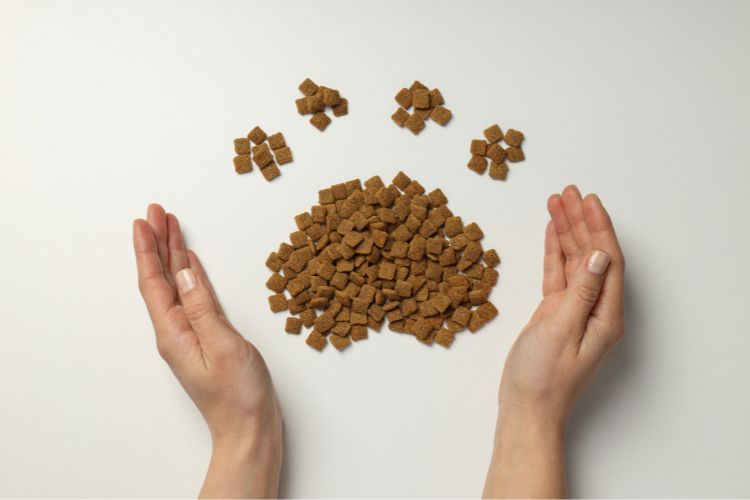Pet Nutrition for Optimal Health
Just as people require a balanced diet to stay healthy, so do our pets. As a pet owner, it’s your responsibility to ensure their diet features high-quality protein, healthy fats, and fruits and vegetables.
But what is the ideal diet to keep pets healthy? Do you need to feed your dog a raw diet? Do cats need to drink milk? And how often should you clean out your pet’s water bowl? Read on for the answers to all of these questions and everything else you need to know about pet nutrition.
The Different Types of Pet Food
Proteins, fats, carbohydrates, vitamins, and minerals are essential for a balanced diet. But what’s the best way to ensure you’re giving your pet all they need to stay healthy?
Dry food
Kibble is an affordable option that provides your pet with an adequate amount of nutrients. Dry food can help prevent tartar build-up, and premium blends are available in hypoallergenic and grain-free recipes for pets with intolerances.
It is possible to feed your dog or cat dry food only because it is designed to provide a complete and balanced meal. However, because there are so many brands on the market and the industry is self-regulated, it’s essential to read the label and understand what you’re getting in the bag or speak to your vet for advice.
Wet food
While you might think you’re doing the right thing by feeding your dog raw meat products such as pet mince or rolls, the RSPCA doesn’t recommend them. As they contain sulphite preservatives, they have been linked to vitamin B1 deficiency, which can be fatal.
Canned food provides an adequate level of nutrients and has a high water content, so it can help keep cats and dogs hydrated. However, feeding your cat or dog only wet food can cause plaque to form on their teeth, so be sure to keep this in mind.
Homemade food
Homemade dog food is a great option for pets with food intolerances, but only as long as you ensure it is a complete and balanced meal. The only way to ensure you feed your pet all the nutrition it needs is to speak with your vet before you begin this regimen so they can advise you on getting the balance right.
Feeding homemade ingredients such as cooked vegetables, pasta, and rice, along with dry premium foods, is a great way to achieve this balance because commercial pet foods are designed as complete and balanced meals. Just ensure you are not overfeeding or underfeeding your pet.

Table scraps
While you might think it’s OK to feed your dog table scraps occasionally, you should avoid the habit as you may inadvertently give them foods that are toxic to pets, such as onions, garlic, mushrooms, sultanas, or chocolate, to name just a few. Sharing food with your pets can also lead to behavioural issues, such as begging at the table.
Bones and raw meat
It’s not recommended that cats or dogs be fed bones or raw meat due to the risk of bacteria making pets sick. Bones can also cause internal blockages and tooth breakages.
If you do choose to give your pet an occasional bone as a treat, it must be raw. Chicken necks and wings are suitable for cats and small dogs, while leg bones with rounded ends are best for dogs.
Treats
Most vets recommend limiting treats to no more than 10% of a pet’s daily calories. However, this can be difficult to calculate. Some types of pet treats have been linked to kidney disease, so commercial treats should be limited to once or twice a week. If you want to reward them between meals, offer them a small amount of dry food instead.
Hydration
Cats and dogs require constant access to fresh water, and it’s important to clean out water bowls daily to prevent bacteria growth and ensure freshness. Most cats and dogs are lactose intolerant, so giving them milk can make them sick.
Can a Poor Diet Cause My Pet Problems?
A diet that is not balanced can lead to short-term health concerns such as digestion problems and stomach upsets, loose bowel movements or constipation. Their coat may look dull, and they may even start to lose fur. Long-term pet nutrition deficiencies can lead to conditions such as heart disease, bloat, premature aging, diabetes, weight loss or obesity, osteoarthritis, a poor immune system, and inflammation.

How Much Food Does My Pet Need?
While dogs should be fed twice a day, cats usually prefer small meals, often around five times a day.
How much you need to feed your pet will depend on its age, breed, and size, and it is generally best to discuss this with your vet. For example, the nutritional requirements of puppies and kittens are greatly different from those of adult or senior pets, and their diet will need to adjust accordingly as they age.
Different breeds of cats and dogs can have different dietary needs, depending on breed-specific health predispositions, activity levels, and size. Always follow the feeding guidelines on commercial foods and use portion control to ensure your pet isn’t overfed or underfed.
For more information on the needs of young dogs, see our article ‘What to feed your puppy’.
When to Consult a Veterinarian about your Pet’s Diet
Is your cat or dog experiencing health problems? Do they have itchy skin that you suspect could be allergies? Diet is always a good place to start looking for answers. Is your pet thriving on their current food, or could they benefit from nutritional adjustments or supplements?
Put your pet’s nutrition and well-being first, and contact Rossmore Veterinary Hospital today for a comprehensive dietary consultation. Let us help you tailor a nutrition plan that ensures your pet’s health, happiness, and vitality for years to come. Call us at (02) 9606 6984 to make an appointment today.
